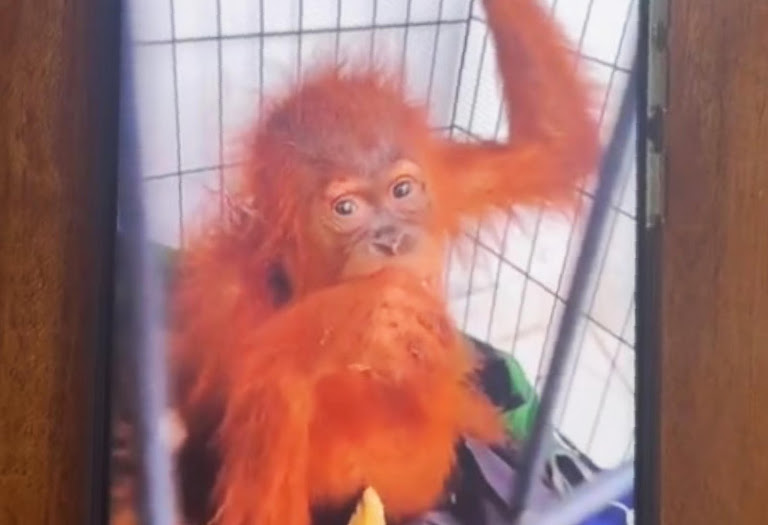Thailand Orangutan Smuggling Exposes Brutal Cost of Global Greed
Beyond arrests: palm oil demand fuels deforestation, pushing orangutans into a deadly black market.

A baby orangutan, rescued. Three men arrested in Thailand, caught selling smuggled apes for upwards of $7,000. It’s a headline designed to elicit a particular kind of outrage: look at these monsters. But to treat this as an isolated incident, a blip on the radar of global conservation, is to profoundly misunderstand the forces at play. This isn’t a wildlife crime story; it’s a mirror reflecting back a global economic system built on relentless extraction, a system that treats natural capital as a limitless resource, and sentient beings as mere commodities.
The details, ripped from the headlines, are sickeningly predictable: Speedboats skirting customs, rented warehouses serving as temporary holding pens, layers of middlemen skimming profits before a final sale to someone wealthy enough to see an endangered ape as a living objet d’art. The suspects “admitted to their involvement in a wildlife trafficking network, claiming to have carried out the operation three to four times.” This isn’t a one-off. It’s a carefully calibrated supply chain, powered by desperation, fueled by obscene wealth, and greased by the wheels of endemic corruption. Applaud the Thai authorities for these arrests, yes. But recognize that the very existence of this network is a damning indictment of international enforcement, a system that clearly fails to outweigh the potential payday. The fact that these men were willing to risk prison to more than double their investment tells you everything you need to know about the warped calculus at play.
But why orangutans? Why these magnificent creatures, driven to the brink? The answer is carved into the landscape of Indonesia and Malaysia, etched onto every palm oil label in your local grocery store. It’s a story of deforestation, driven by insatiable demand for cheap vegetable oil. Between 1990 and 2010 alone, Southeast Asia lost 32 million hectares of forest, an area roughly the size of Poland. And while some point fingers at smallholder farmers, the reality is that massive multinational corporations are the prime drivers, clearing rainforest at an alarming rate to plant lucrative palm plantations. This isn’t some abstract ecological concern; it’s a direct assault on the orangutan’s habitat, squeezing them into ever-smaller pockets of forest, making them vulnerable to poachers, and driving up their value on the black market. The economics are brutally simple: habitat loss equals population decline equals premium price.
According to Mr. Pongsakorn and Mr. Supawat, they purchased the orangutans for 70,000 baht each and resold them for 120,000 baht. They added that the price could rise to 250,000 baht if the animals were smuggled to a third country.
Zoom out, and the pattern repeats across species and continents. As Elizabeth Kolbert argued in The Sixth Extinction, we are living through a period of unprecedented biodiversity loss, driven not by natural disasters, but by human activity. The illegal wildlife trade, from pangolins to parrots, is merely one particularly grotesque symptom of a larger, more systemic disease: a global economic system that consistently externalizes environmental costs, prioritizing short-term profits over long-term sustainability. It’s a failure to see the interconnectedness of ecosystems, the vital role biodiversity plays in regulating climate, and the long-term consequences of unchecked exploitation. We’re not just losing orangutans; we’re actively dismantling the life support systems of the planet.
The arrest of these three men is a fleeting victory, a single battle won in a war we are currently losing. To truly tackle this crisis, we need to fundamentally rethink our relationship with the natural world. We need to confront the uncomfortable truth that our consumption habits — from the palm oil in our cookies to the timber in our furniture — are directly contributing to the destruction of orangutan habitat. We need to dismantle the economic incentives that drive this destruction, strengthen international enforcement, and create alternative, sustainable livelihoods for communities dependent on these resources. But above all, we need to acknowledge that the fate of the orangutan is inextricably linked to our own. If we continue down this path, we will not only lose these magnificent creatures, but also the very foundations of our own survival. The tragedy of the smuggled orangutan is a warning, a stark reminder that the natural world is not a limitless resource to be exploited, but a complex and fragile web that we depend on for our very existence. Ignore it at our peril.









